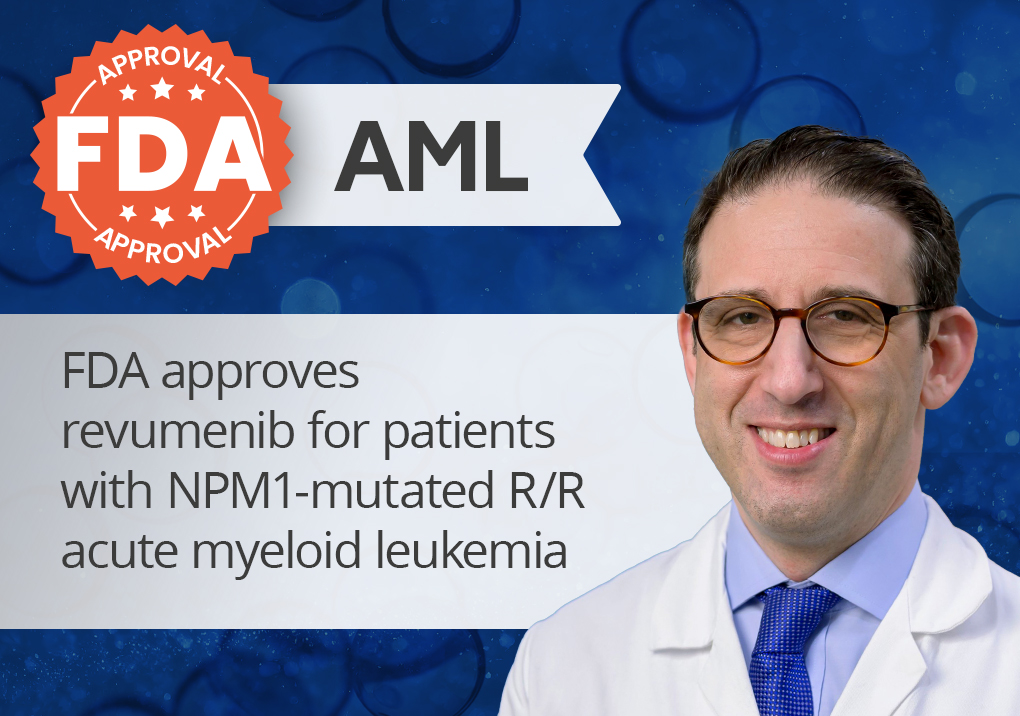FDA approves revumenib for patients with R/R AML and a susceptible NPM1 mutation
On October 24, 2025, the U.S. Food and Drug Administration (FDA) approved the menin inhibitor revumenib for the treatment of adult and pediatric patients aged ≥1 year with relapsed/refractory (R/R) acute myeloid leukemia (AML) harboring a susceptible nucleophosmin 1 (NPM1) mutation, who have no satisfactory alternative treatment options.1
AML is an aggressive, rapidly progressing hematologic malignancy characterized by uncontrolled proliferation of myeloid precursor cells in the bone marrow.2 NPM1 mutations occur in approximately 30% of adults with AML and are associated with disease relapse and poor prognosis.3 Revumenib marks the first FDA-approved therapy for both R/R AML with an NPM1 mutation and R/R acute leukemia with a KMT2A translocation.4
The approval was supported by data from the Phase II AUGMENT-101 trial (NCT04065399), an open-label, multicenter study evaluating revumenib monotherapy in patients with R/R AML and a confirmed NPM1 mutation.1 The primary efficacy outcome measures were complete remission (CR) rate, CR with partial hematologic recovery (CRh), duration of CR+CRh, and rate of conversion from transfusion dependence to transfusion independence. Among 65 evaluable patients, the CR+CRh rate was 23.1% (95% CI: 13.5, 35.2), with a median CR+CRh duration of 4.5 months (95% CI: 1.2, 8.1). Of patients who were transfusion-dependent at baseline, 17% achieved transfusion independence during treatment.1,4
We recently caught up with Eytan Stein, MD, Memorial Sloan Kettering Cancer Center, New York, NY, at this year’s SOHO Annual Meeting, who shared encouraging longer-term results from the AUGMENT-101 trial, stating, “I think the updated results are quite reassuring. What we look for when we look at longer follow-up is to make sure that no new safety signals have emerged or that the survival has suddenly dropped off dramatically. We don’t see any new safety signals. Similarly, we’re excited by the results where the remission rates remain quite high in the range of 60% as an overall response rate and a rate of complete remission and complete remission with partial hematologic recovery in the range of 25%.”
Safety warnings for revumenib include differentiation syndrome, QTc interval prolongation and Torsades de Pointes, and embryo-fetal toxicity.1
The approval of revumenib for NPM1-mutated AML provides a targeted, first-in-class menin inhibitor option for patients with R/R disease who lack satisfactory alternatives, marking an important step forward in precision therapy for this subset of patients.
References
- U.S. Food and Drug Administration. FDA approves revumenib for relapsed or refractory acute myeloid leukemia with a susceptible NPM1 mutation. Available here. (Last accessed 28/10/2025).
- Vakiti A, Reynolds SB, Mewawalla P. Acute Myeloid Leukemia. Available here. (Last accessed 28/10/2025).
- Diamantidis MD, Vlachou MS, Katsikavela A, et al. NPM1-Mutated AML: Deciphering the Molecular and Clinical Puzzle in the Era of Novel Treatment Strategies. Cancers (Basel). 2025 Jun 23;17(13):2095.
- Syndax. Press Release: Syndax Announces FDA Approval of Revuforj® (revumenib) in Adult and Pediatric Patients with Relapsed or Refractory NPM1 Mutated Acute Myeloid Leukemia. Available here. (Last accessed 28/10/2025).
Written by Anya Dragojlovic Kerkache
Reviewed by Natalie Markova





